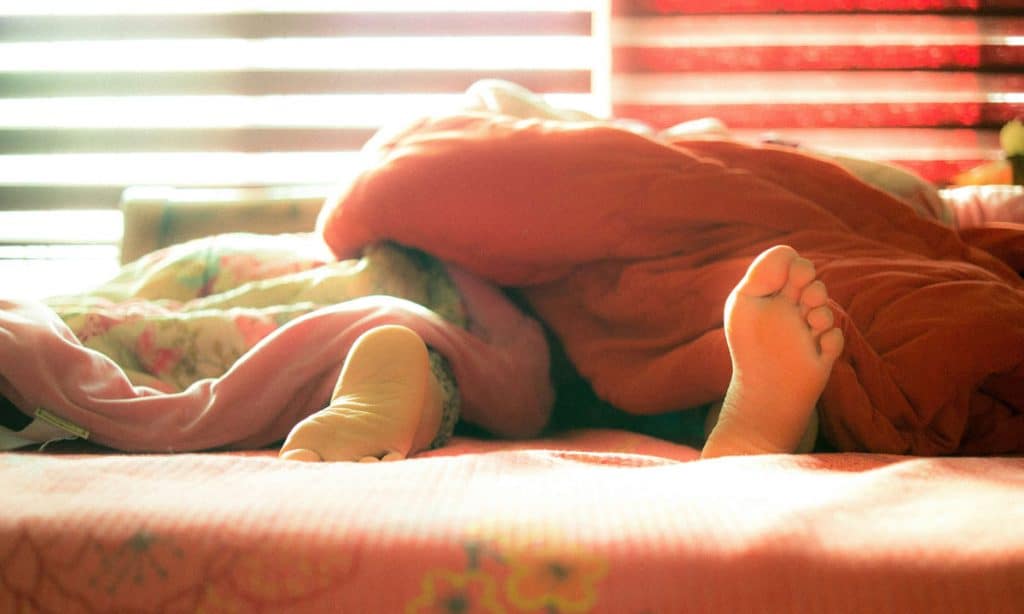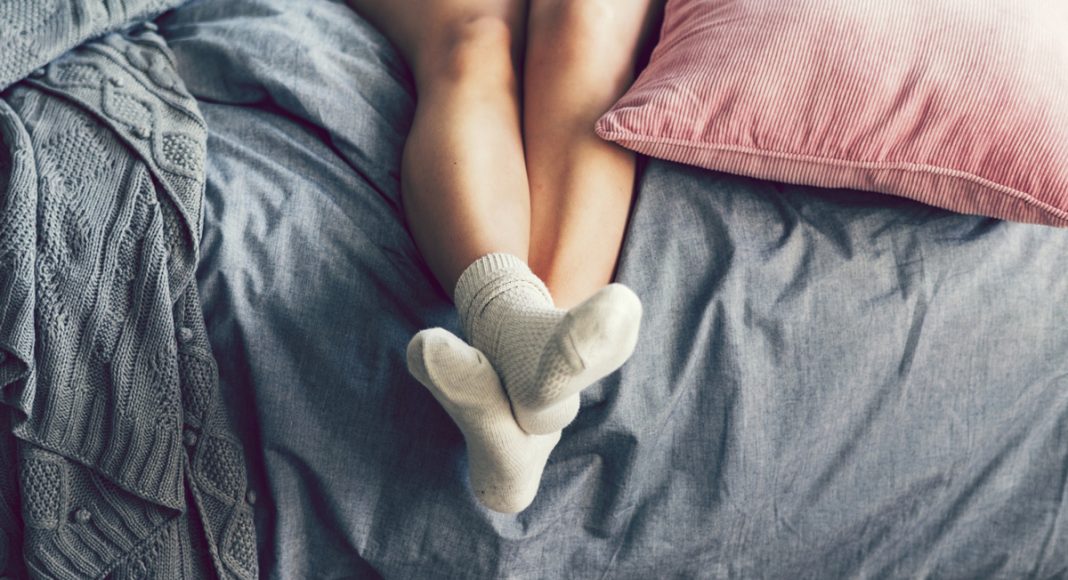Even though there’s currently no cure, there are natural treatment methods available like cannabis and cannabidiol that can help alleviate many RLS symptoms.
What would you do if you felt a consistent tingling, itching, and/or crawling sensation within your legs every day? How would you feel if you had to make various lifestyle changes because of constant body and leg restlessness?
People with restless leg syndrome (RLS) not only make lifestyle adjustments because of many uncomfortable symptoms they experience, but many must endure chronic symptoms that can take a toll on their quality of life. According to the National Institute of Neurological Disorders & Strokes, it has been estimated that roughly 7% to 10% of the U.S. population is impacted by RLS. Even though there’s currently no cure for this syndrome, there are natural treatment methods available like cannabis and cannabidiol that can help alleviate many RLS symptoms.
Background of Restless Leg Syndrome & Its Significant Impact on One’s Life
Restless leg syndrome is classified as a neurological disorder that can impact anyone of any age. However, this syndrome gets more severe and painful as one gets older even though it’s not life-threatening. Sometimes, RLS is referred to as Willis-Ekbom Disease or Wittmaack-Ekbom’s Syndrome. These names come from one of the first doctors who discovered and identified RLS, which was Dr. Karl-Axel Ekbom in 1943.
Generally, restless leg syndrome causes different symptoms with many of them occurring and worsening in the evening. Thus, sleeping difficulties often occur because this syndrome frequently wakes people up or it becomes so uncomfortable that they cannot fall asleep. As a result, numerous people with RLS have a poor quality of life and a decline in their overall well-being.

In addition, according to the National Sleep Foundation, some individuals describe RLS as the following, “…the sensation of ants crawling through their legs or carbonation running through their veins.” Normally, when an individual is relaxing, sitting, or lying down, their symptoms get progressively worse. The severity of this disorder differs per person though. Most people experience relief after moving around a lot. Whereas, others don’t find relief from movements at all.
RELATED: Can Cannabis Help With Chronic Fatigue Syndrome?
Currently, the precise cause of RLS is unidentified. But, there are different conditions that are closely linked to it. Some people can even develop RLS from medication-causing side effects. Unfortunately, since the exact cause of RLS is yet to be identified, it’s difficult to prevent it.
Common RLS Side Effects and Painful Symptoms
Although RLS affects every individual differently, there are multiple side effects and symptoms that are felt by most RLS patients. The following symptoms are felt by most affected individuals:
- Sleeping difficulties and interruptions
- Daytime fatigue and sleepiness
- Restlessness, which can manifest into repetitive movements like tossing and turning in bed or pacing back and forth
- Tingling, itching, and/or crawling sensations within the legs
- A strong force to move and shake the legs to alleviate uncomfortable sensations
- Unintentional movements or leg jolting during one’s sleep cycle, while resting, or even while wide-awake
Additionally, physical side effects include sleep loss, daytime sleepiness, overall discomfort, itchiness, and leg restlessness. Because this disorder can cause discomfort at any time of the day or night, some individuals opt out of social gatherings and events because of the pain they experience when sitting or standing for lengthy periods of time. Therefore, various emotional symptoms occur like loneliness, anxiety, depression, and isolation. On the plus side though, different treatment methods are available to help those with RLS live the best life they can. One rapidly-growing natural treatment method that can help is cannabis and CBD.
Traditional and Non-Traditional RLS Treatment Methods: What’s Right for You?
In recent years, RLS has gained more attention. However, this disorder has been documented and examined for centuries. There are both traditional and non-traditional treatment methods available, and it’s up to the individual to decide what’s best for them. Several traditional RLS treatment methods include vein treatments, foot wrap treatments, pharmaceutical medications, and specific exercises on a regular basis. There are also non-traditional, natural methods available too. Some of these include calf massages, warm and cold compresses, ice packs, warm baths, and cannabis and CBD products.
How Cannabis and Cannabidiol Usage Can Help Alleviate RLS Symptoms
Moreover, one 2017 study discovered that inhaled medicinal cannabis lessened RLS symptoms. Five out of the six subjects experienced full symptom remission after consuming cannabis, and CBD played a large role in symptom alleviation. After the cannabis treatment ended, all participants experienced sleep improvements. Another study found that Sativex (a sublingual cannabis-based spray that contains CBD and THC) helped 40-50 percent of the RLS patients with their sleeping issues. Fortunately, cannabis and CBD can help treat insomnia, but especially CBD, which often delivers sedative and mellow effects to users.
RELATED: Science: Marijuana Can Stop Restless Leg Syndrome
So far though, there’s a lack of clinical trials and studies on the topic of medicinal cannabis helping treat RLS. However, there are numerous anecdotal success stories that RLS patients continue to share. Due to cannabis and CBD’s analgesic properties, RLS patients who experience regular pain can find relief from consuming different cannabinoids. Also, because of the relief that’s delivered from cannabis, individuals can relax more easily, which results in better bedtime preparation to combat insomnia.
Also, due to the sleeping difficulties most RLS patients experience, other problems could arise like anxiety, depression, lessened mental functioning, and wear and tear to the body’s immune system. Fortunately, though, CBD contains natural anti-anxiety and anti-depressant properties. This cannabinoid can also provide the body with antioxidants, which can help improve one’s immune system.
Optimal Cannabis Strains to Alleviate RLS Symptoms
On another note, there are various cannabis strains that can be consumed to help alleviate RLS symptoms. The strains individuals use should be appropriate to the symptoms they want treated though. If RLS patients want to use cannabis to help with insomnia, high THC or high CBD strains are recommended. A few examples of these include granddaddy purple (indica), purple kush (indica), ACDC (hybrid and high CBD), and Charlotte’s Web (high CBD). All these strains can help alleviate pain, anxiety, and insomnia while also delivering physically and mentally relaxing effects.
Then, for nearly immediate relief, the best consumption methods include inhalation, sublingual administration, and topical usage. All in all, it’s essential to find the right cannabis strain and consumption method that’ll fit one’s exact needs and wants.
Although restless leg syndrome impacts twice as many females as males, it can still be detrimental to one’s quality of life regardless of their gender. If traditional treatment methods are ineffective or do more damage than good, it may be a sign to try something more natural like cannabis and/or Cannabidiol. If you could naturally improve your well-being and alleviate many painful chronic symptoms, would you?


